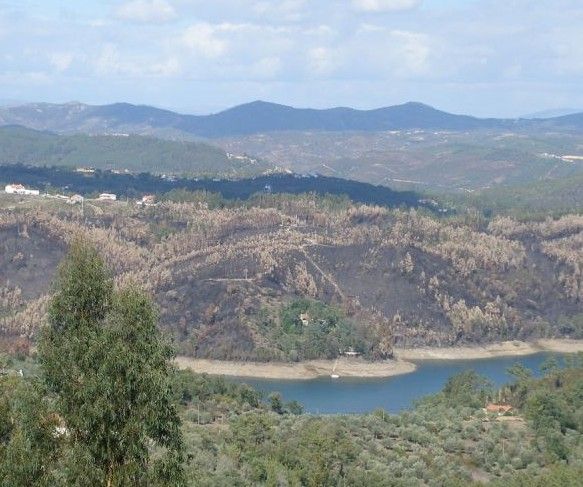In August 2005, I swiftly retreated from a two-meter-wide flame-ball which bounced ferociously down the steeply inclined lane which led to my lakeside house situated on the Albufeira do Castelo do Bode just in front of the picturesque but abandoned estalagem Ilha do Lombo.
Within minutes, the wildfire advanced to occupy the three boundaries where I had previously installed an irrigation system which was supplied with water pumped from a pontoon at the beach which formed the fourth boundary. Soon I was joined by neighbours who had crossed nobly in small boats from the safety of the opposite shore carrying an array of extinguishers, brooms, buckets and spades to repel any further advance towards my home which was left as a tiny oasis of green in an ashen landscape
This fiery experience was one of several which endeavoured to engulf either home or business after my migration to Portugal in 1989. Following each such regional devastation, there was the usual wringing of hands and the utterance of official promises of reform and compensation. These were only to be forgotten as soon as the autumnal rains arrived and the implementation of other political subjects took priority.
During recent weeks we have seen repetitive media coverage (in some cases using words and images from yesteryear) of rustic fires and heard the usual recriminations between previously rival governments, reports of decrepit aircraft/equipment and the bravery and determination of citizens in the face of extreme sadness caused by destruction of property, injury and death.
Added to this has been the chilling inference that responsibility lies not only with the inevitability of amateur arsonism but indirectly with mining interests and intensive agriculture which intend to exploit the fragile treasures of mother earth.
If maximum temperatures and prolonged periods of drought continue to be the order of the day, then the spread of wildfires will be inevitable. In consequence, it is essential that preventative measures be undertaken now and not later. One idea that has been mooted for many years is the strategic installation of a grid consisting of pipes to carry water pumped from reservoirs and rivers to forested uplands so that firebreaks may prevent the spread of flames and also help to extinguish them on lower slopes.
The defence of the homeland must take priority over the contingency for wars abroad. There should be an amalgamation of the police, armed forces and civil entities to form regional squads which are specifically trained and equipped to respond to natural disasters. Finance must be forthcoming by the diversion as a percentage of GDP to provide all that is essential for the peaceful wellbeing of the populace and the avoidance of further loss of our natural habitat.
by Roberto Cavaleiro - Tomar. 26 August 2025















